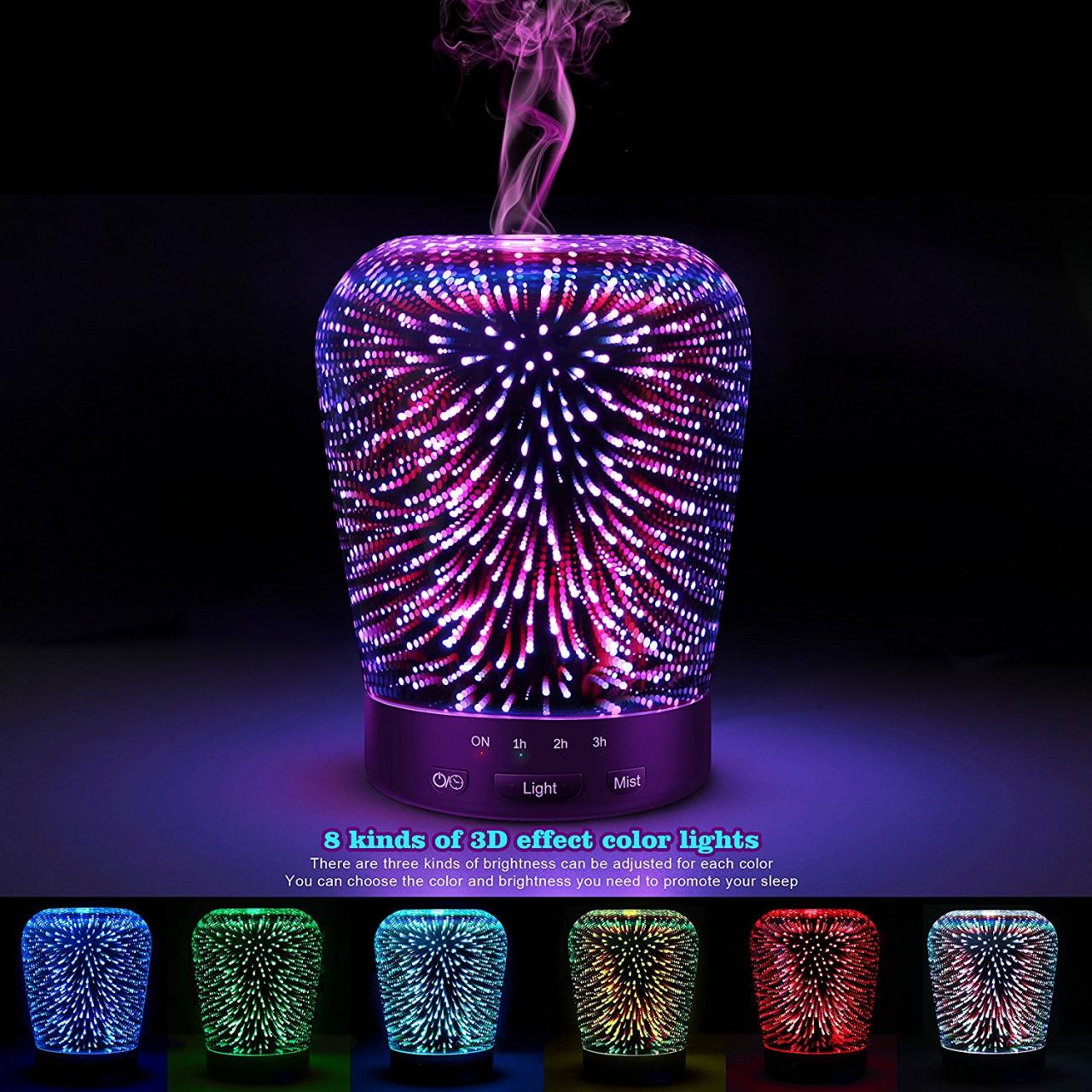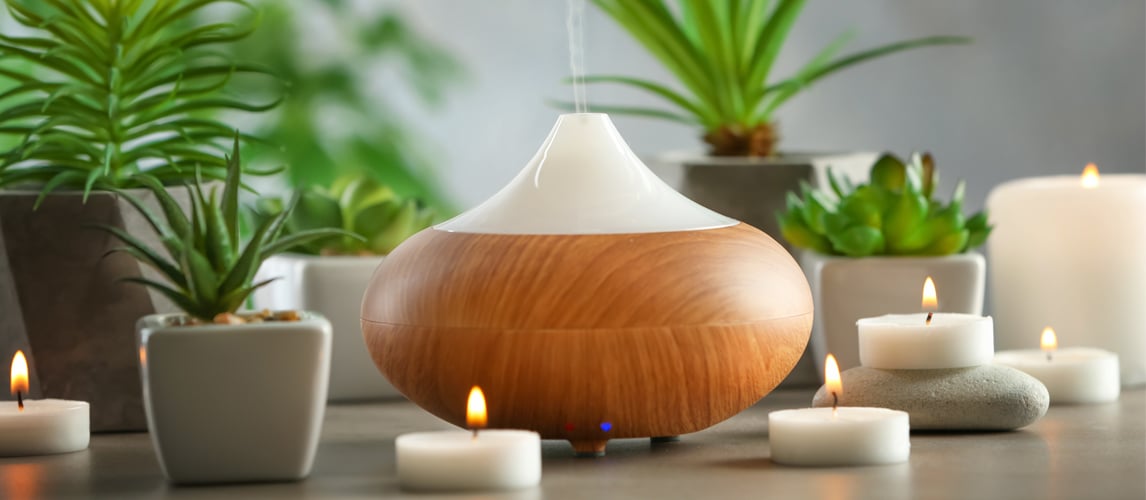Embark on a fragrant journey as we delve into the world of aromatherapy diffusers. From understanding the different types and their unique benefits to discovering the therapeutic powers of essential oils, this guide will equip you with the knowledge to create a haven of tranquility in your own home.
Prepare to be captivated by the soothing scents and transformative effects of aromatherapy as we unravel the secrets to choosing the perfect diffuser for your needs.
Types of Aromatherapy Diffusers
Aromatherapy diffusers disperse essential oils into the air, creating a fragrant and therapeutic environment. Various types of diffusers are available, each with unique features and benefits.
Ultrasonic Diffusers
- Utilize ultrasonic waves to create vibrations, breaking down essential oils into fine particles.
- Generate a cool mist, preserving the integrity of the oils.
- Relatively quiet operation, making them suitable for bedrooms or offices.
Nebulizing Diffusers
- Employ a high-pressure stream of air to atomize essential oils, producing a fine mist.
- Provide the most potent aroma, as the oils are not diluted with water.
- Can be noisy during operation, making them less suitable for quiet environments.
Evaporative Diffusers
- Use a fan to circulate air through a pad saturated with essential oils.
- Produce a gentle, diffused aroma that is less intense than other types.
- Easy to clean and maintain, making them a practical choice for daily use.
| Type | Method | Mist Type | Aroma Intensity | Noise Level | Ease of Cleaning |
|---|---|---|---|---|---|
| Ultrasonic | Ultrasonic waves | Cool mist | Moderate | Quiet | Moderate |
| Nebulizing | High-pressure air | Fine mist | Strong | Noisy | Difficult |
| Evaporative | Fan circulation | Gentle mist | Weak | Quiet | Easy |
Essential Oils for Aromatherapy

Essential oils, concentrated plant extracts, are the lifeblood of aromatherapy. Each oil boasts a unique blend of therapeutic compounds, offering a wide range of physical and emotional benefits.
Choosing the right essential oil for your specific needs is crucial. Here’s a comprehensive guide to the most popular oils, their properties, and recommended uses:
Properties and Uses of Essential Oils
| Essential Oil | Properties | Recommended Uses |
|---|---|---|
| Lavender | Calming, relaxing, sleep-promoting | Stress relief, anxiety, insomnia |
| Peppermint | Stimulating, energizing, pain-relieving | Headaches, migraines, nausea |
| Tea Tree | Antibacterial, antifungal, antiviral | Skin infections, acne, athlete’s foot |
| Eucalyptus | Decongestant, expectorant, immune-boosting | Colds, flu, sinus infections |
| Lemon | Uplifting, mood-boosting, purifying | Depression, anxiety, air purification |
Benefits of Aromatherapy

Aromatherapy, the practice of using essential oils for therapeutic purposes, offers a wide range of benefits for physical, emotional, and mental health.
Physically, aromatherapy can alleviate pain, reduce inflammation, improve digestion, boost immunity, and promote relaxation. Emotionally, it can uplift mood, reduce stress and anxiety, and enhance sleep. Mentally, aromatherapy can improve cognitive function, enhance memory, and promote a sense of well-being.
Specific Conditions
- Stress and Anxiety:Lavender, chamomile, and bergamot essential oils have calming effects that can help reduce stress and anxiety.
- Sleep Disorders:Lavender, valerian, and ylang-ylang essential oils can promote relaxation and improve sleep quality.
- Pain Management:Peppermint, eucalyptus, and rosemary essential oils have analgesic properties that can help relieve pain.
- Respiratory Conditions:Eucalyptus, tea tree, and peppermint essential oils can help clear congestion and improve breathing.
- Skin Care:Tea tree, lavender, and rosemary essential oils have antibacterial and anti-inflammatory properties that can benefit skin conditions such as acne and eczema.
Choosing the Best Aromatherapy Diffuser
Selecting the ideal aromatherapy diffuser entails careful consideration of several crucial factors. These include the size of the room where the diffuser will be used, the desired features, and the budget allocated for the purchase.
To assist in the decision-making process, the following table Artikels the key features and specifications of some popular aromatherapy diffusers available in the market:
Diffuser Type
- Ultrasonic Diffusers:Utilize high-frequency sound waves to create a fine mist, dispersing essential oils into the air. They are typically quiet and energy-efficient.
- Nebulizing Diffusers:Break down essential oils into microscopic particles without the use of heat or water, preserving their therapeutic properties. They produce a powerful and concentrated mist.
- Heat Diffusers:Employ heat to evaporate essential oils, releasing their fragrance into the air. They are less common than ultrasonic and nebulizing diffusers.
Capacity
The capacity of a diffuser determines the amount of water and essential oils it can hold. Larger capacity diffusers are suitable for larger rooms, while smaller capacity diffusers are ideal for smaller spaces.
Coverage Area
The coverage area of a diffuser indicates the size of the room it can effectively scent. It is important to choose a diffuser with a coverage area that matches the size of the intended space.
Features
- Timer:Allows you to set the duration of diffusion, ensuring that the diffuser operates for a specific period of time.
- Adjustable Mist Intensity:Enables you to control the intensity of the mist, customizing the fragrance level to your preference.
- LED Lighting:Some diffusers feature LED lighting, providing ambiance and creating a relaxing atmosphere.
- Automatic Shut-off:Ensures safety by automatically turning off the diffuser when the water level is low.
Budget
Aromatherapy diffusers come in a wide range of prices, depending on their features, capacity, and brand. It is important to establish a budget before making a purchase to ensure that the chosen diffuser aligns with your financial constraints.
Safety Considerations
While aromatherapy diffusers can provide numerous benefits, it’s essential to be aware of potential risks and precautions to ensure safe and effective use.
The primary concern associated with aromatherapy diffusers is the misuse of essential oils. Essential oils are highly concentrated and can cause adverse effects if not used properly.
Proper Usage Guidelines
- Always follow the manufacturer’s instructions for your specific diffuser.
- Use high-quality, 100% pure essential oils from reputable sources.
- Dilute essential oils with a carrier oil, such as jojoba or almond oil, before applying them to the skin or using them in a diffuser.
- Avoid using essential oils on pets or children without consulting a healthcare professional.
- Never ingest essential oils.
- If you experience any irritation or adverse effects, discontinue use immediately and consult a doctor.
Conclusive Thoughts
In closing, selecting the best aromatherapy diffuser is a symphony of personal preferences and therapeutic goals. Whether you seek relaxation, rejuvenation, or a touch of aromatic bliss, the knowledge gained through this guide will empower you to create a sanctuary that nurtures your well-being.
So, embrace the aromatic embrace of aromatherapy and let the power of scent transform your space into a haven of tranquility.